Siri’ di Persimpangan Generasi: Peran dan Makna Nilai Siri’ pada Dewasa Awal Suku Bugis
(1) Sanata Dharma University
(2)
(3)
(4)
(*) Corresponding Author
Abstract
This study aims to explore the meaning of Siri’ for the young adults in the Bugis tribe. This research was conducted using a descriptive phenomenological approach with in-depth interviews with the Bugis community. The participants in this study consisted of 3 people who were all of Bugis descent and were born and raised in the Bugis community. Analysis of the interview transcript data was carried out using the analysis procedure by Moustakas (1994). This study found 8 themes in the meaning of the Siri’ with the essential meaning being the value of Siri’ as shame and self-esteem. The formation of the meaning of Siri’ is based on efforts to maintain the good name of the family, a reflection of women's dignity, the agility and courage of men, and efforts to maintain each other's moral values. Currently, the value of Siri’ in society has been considered to have shifted due to the rapid mindset and development of the times, such as the development of technology and social media which has made people indifferent to the values in their culture
Keywords
Full Text:
PDFReferences
Abdullah, H. (1985). Manusia Bugis Makassar: suatu tinjauan historis terhadap pola tingkah laku dan pandangan hidup manusia Bugis Makassar. Inti Idayu Press
Alimuddin, A. (2020). Makna simbolik uang panai’ pada perkawinan adat suku Bugis Makassar di kota Makassar. Jurnal Sosial dan Politik, 10(2), https://doi.org/10.47030/aq.v10i2.85
Al-Sharqi, L, Hashim, K & Kutbi, I. (2015). Perceptions of social media impact on student’s social behavior : a comparison between arts and science students. International journal of education and social science, 2(4), 122-131
Andaya, Leonard Y. (1981). The heritage of Arung Palakka. Martinus Nijhoff.
Arnett, J. J. (2000). Emerging adulthood: A theory of development from the late teens through the twenties. American Psychologist, 55(5), 469–480. https://doi.org/10.1037/0003-066X.55.5.469
Asry, D. M. (2017). Siri’ as Bugis people’s dignity in qur’anic perspective. 235–241. https://doi.org/10.2991/icqhs-17.2018.37
Badewi, M. H. (2019). Nilai Siri’ dan pesse dalam kebudayaan Bugis-Makassar, dan relevansinya terhadap penguatan nilai kebangsaan. JSW (Jurnal Sosiologi Walisongo), 3(1), 79–96. https://doi.org/10.21580/jsw.2019.3.1.3291
Birt, L., Scott, S., Cavers, D., Campbell, C., & Walter, F. (2016). Member checking: A tool to enhance trustworthiness or merely a nod to validation?. Qualitative health research, 26(13), 1802–1811. https://doi.org/10.1177/1049732316654870
Creswell, J. W. (2012). Educational research: Planning, conducting, and evaluating quantitative and qualitative research (4th ed). Pearson.
Englander, M. (2012). The interview: Data collection in descriptive phenomenological human scientific research. Journal of Phenomenological Psychology, 43(1), 13–35. https://doi.org/10.1163/156916212X632943
Fitriani, A.B., Siscawati, M. (2021). Posisi perempuan Bugis dalam tradisi, ritual dan norma budaya siri. Jurnal Ilmu Agama dan Kebudayaan, 21(2), https://doi.org/10.32795/ds.v21i2.2126
Gonzales, L.M. dan Hancock, T.J. (2011). Mirror, mirror on my facebook wall: effects of exposure to facebookon self esteem. Cyberpsychology, Behavior, and Social Networking. 14 (1), 79-83
Gusnawaty, G., Lukman, L., Nurwati, A., Adha, A., Nurhawara, N., Edy, A. (2022). Strategy of kinship terms as a politeness model in maintaining socialinteraction: local values towards global harmony. https://doi.org/10.1016/j.heliyon.2022.e10650
Haferkamp, H., Smelser, N. J. (1992). Social change and modernity. University of California Press
Idrus, N. I. (2003). To take each other: Bugis practice of gender, sexuality, and marriage. Ph.D Thesis. Canberra: Research School of Pacific and Asian Studies. Australian National University.
Kaplan, R. M. (1990). Behavior as the central outcome in health care. American Psychologist, 45, 1211-1220. http://dx.doi.org/10.1037/0003-066X.45.11.1211
Koentjaraningrat. (1981). Pengantar antropologi. Rineka Cipta.
Makkasau, K. (2022). Refleksi budaya dan kearifan lokal suku Bugis “konsep budaya panngaderreng di era globalisasi. Deepublish.
Mattulada. (1975). Latoa: satu lukisan analitis terhadap antropologi-politik orang Bugis (a descriptive analysis of the political anthropology of the buginese). Universitas Indonesia
Meiyani, E. (2010). Sistem kekerabatan Orang Bugis di Sulawesi Selatan (suatu analisis antropologi - sosial) wija na bati in Bugis kinship system in south sulawesi a social anthropology analitical . Jurnal Al-Qalam, 16(26), 181-190.
Millar, S. (1983). On interpreting gender in Bugis society. American Ethnologist, 10(3), 477-493
Mukaromah, M., Hamdani, K., Saputra, S., Abas, A. R. P. R., Hidayat, I., & Wahyuni, A. S. (2022). Tudang madeceng: Transformasi nilai positif Sigajang Laleng Lipa’ dalam penyelesaian sengketa non litigasi. Al-Azhar Islamic Law Review, 4(1), https://doi.org/10.37146/ailrev.v4i1.120
Nawawi, N. (2015). Asimilasi Lontara Pangadereng dan Syari’at Islam: Pola perilaku masyarakat Bugis-Wajo. Al-Tahrir: Jurnal Pemikiran Islam, 15(1), 21. https://doi.org/10.21154/al-tahrir.v15i1.168
Padilla‐Walker, L. M., Barry, C. M., Carroll, J. S., Madsen, S. D., & Nelson, L. J. (2008). Looking on the bright side: The role of identity status and gender on positive orientations during emerging adulthood. Journal of Adolescence, 31(4), 451–467.
Said, M. (2013). Konstruk teoritis manusia Bugis. Seminar Internasional Seminar La Galigo. https://www.google.com/url?sa=t&rct=j&q=&esrc=s&source=web&cd=&cad=rja&uac
Santrock, J. W. (2011). Life-span development (13th ed). McGraw-Hill Higher Education.
Willig, C. (2013). Introducing qualitative research in psychology (3rd ed). McGraw-Hill Open University Press.
Zainal., Wahyuni, S. (2018). Siri’ na passe dalam masyarakat Bugis di kota tanjungpinang. Jurnal Masyarakat Maritim, 2(1), 34-44.
DOI: https://doi.org/10.24071/suksma.v5i2.8012
Refbacks
- There are currently no refbacks.


